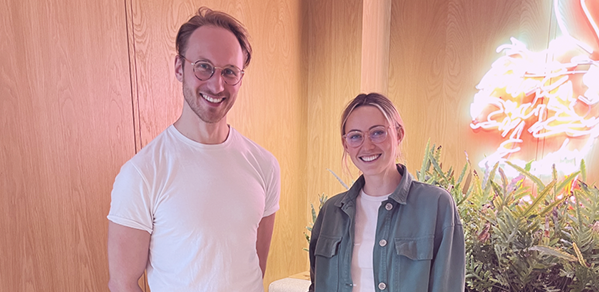Ben, an ex-medical device engineer and bioelectronics researcher, and Elise, electrical engineer-turned-neuro-oncology researcher, are developing a neural interface platform which can be implanted in the brain in a minimally invasive procedure. Readings can be taken over an extended period, monitoring episodes of unusual brain activity as it happens, in real time.
Ben and Elise are developing this technology, in collaboration with surgeons, to deploy a procedure that would require no need for major surgery or an overnight stay in hospital – as is current practice. The technology, they say, has the potential to open the door to long-term recordings that are not currently possible, and it is hoped it will treat a broad range of diseases from cancer to mental health disorders.
Using the latest round of investment, led by Blackbird Ventures (with additional support from Possible Ventures, Cambridge Engineering alumnus Amar Shah, co-founder of Wayve Technologies, and others), Opto will expand its engineering team and push towards validation of its core technology platform. Supporting Opto in its mission are a team of clinical and technical advisors from around the world.
“We’re excited by our potential to treat many different neurological disorders,” said Ben. “We’re currently exploring a type of brain cancer, called glioblastoma, with some of our clinical partners. This is a horrendous disease, with a life expectancy of just 14 months from diagnosis. Patients, and the doctors who treat them, are desperate for tools that can help and lead to improved outcomes. We believe this is an area of medicine we can impact the fastest. Alongside this, we’re exploring several other diseases, where we are focused on making the implantation procedure more simple and less risky for the patient.”
Elise added: “Our focus is on pushing the boundaries of what's possible with technology and data, while collaborating with a consortium of leading clinicians from across the globe. We have some collaborations with research hospitals around the world, which is exciting, and we will be revealing more on this soon.”
Last year, Opto won the 2022 Wolfson Enterprise Competition, after Ben and Elise successfully pitched their concept at the time to a panel of judges, entrepreneurs and venture capitalists. The judges were particularly impressed with the way in which they had both translated their PhD research, carried out in the Department of Engineering’s Bioelectronics Laboratory, into a product with practical applications in the real world.
We asked Ben and Elise: Who or what inspires you?
Ben said: “I’m inspired whenever I talk to the neurosurgeons and clinicians who we work with. They have one of the hardest jobs in the world; it is technically, physically and mentally demanding. The fact that after a 12 to 18 hour-long shift (through the night) they can and still do pick up the phone to speak to us, just shows how much they care about improving people’s lives and working tirelessly to do so.”
Elise said: “I’m inspired by leveraging technology and watching it transform healthcare. Sadly, there are so many patients with little to no treatment options. While teams of clinicians are working tirelessly to treat them, we need better tools that enable healthcare professionals to both understand and treat diseases. This is what gets me out of bed in the morning.”
Image credit: Ben Woodington and Elise Jenkins, co-founders of Opto
Reproduced courtesy of the University of Cambridge



